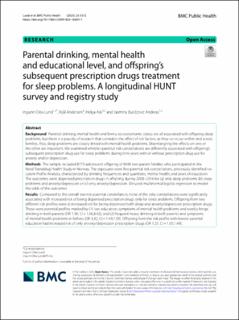| dc.contributor.author | Lund, Ingunn Olea | |
| dc.contributor.author | Andersen, Njål | |
| dc.contributor.author | Ask, Helga | |
| dc.contributor.author | Burdzovic Andreas, Jasmina | |
| dc.date.accessioned | 2023-09-13T05:35:29Z | |
| dc.date.available | 2023-09-13T05:35:29Z | |
| dc.date.created | 2023-07-18T15:02:58Z | |
| dc.date.issued | 2023 | |
| dc.identifier.issn | 1471-2458 | |
| dc.identifier.uri | https://hdl.handle.net/11250/3088990 | |
| dc.description.abstract | Background Parental drinking, mental health and family socioeconomic status are all associated with offspring sleep problems, but there is a paucity of research that considers the effect of risk factors, as they co-occur within and across families. Also, sleep problems are closely linked with mental health problems. Disentangling the effects on one or the other are important. We examined whether parental risk constellations are differently associated with offspring’s subsequent prescription drug use for sleep problems during nine years with or without prescription drug use for anxiety and/or depression. Methods The sample included 8773 adolescent offspring of 6696 two-parent families who participated in the Nord-Trøndelag Health Study in Norway. The exposures were five parental risk constellations, previously identified via Latent Profile Analysis, characterized by drinking frequencies and quantities, mental health, and years of education. The outcomes were dispensed prescription drugs in offspring during 2008–2016 for (a) only sleep problems (b) sleep problems and anxiety/depression or (c) only anxiety/depression. We used multinomial logistic regression to model the odds of the outcomes. Results Compared to the overall low-risk parental constellation, none of the risky constellations were significantly associated with increased risk of being dispensed prescription drugs only for sleep problems. Offspring from two different risk profiles were at increased risk for being dispensed both sleep and anxiety/depression prescription drugs. These were parental profiles marked by (1) low education, symptoms of mental health problems and weekly binge drinking in both parents (OR 1.90, CI=1.06;3.42); and (2) frequent heavy drinking in both parents and symptoms of mental health problems in fathers (OR 3.32, CI=1.49;7.39). Offspring from the risk profile with lowest parental education had increased risk of only anxiety/depression prescription drugs (OR 1.25, CI=1.05;1.49). Conclusion Our findings suggest that parental risk constellations are not associated with increased risk of offspring receiving sleep medications without also receiving anxiety/depression medications, as two risk constellations were associated with increased risk of dispensation of both sleep and anxiety/depression prescription drugs. Receiving both may be an indication of severity. The findings underscore the importance of including measures of mental health problems when investigating sleep problems to avoid misattribution of effects | en_US |
| dc.description.abstract | Parental drinking, mental health and educational level, and offspring’s subsequent prescription drugs treatment for sleep problems. A longitudinal HUNT survey and registry study | en_US |
| dc.language.iso | eng | en_US |
| dc.rights | Navngivelse 4.0 Internasjonal | * |
| dc.rights.uri | http://creativecommons.org/licenses/by/4.0/deed.no | * |
| dc.title | Parental drinking, mental health and educational level, and offspring’s subsequent prescription drugs treatment for sleep problems. A longitudinal HUNT survey and registry study | en_US |
| dc.type | Peer reviewed | en_US |
| dc.type | Journal article | en_US |
| dc.description.version | publishedVersion | en_US |
| cristin.ispublished | true | |
| cristin.fulltext | original | |
| cristin.qualitycode | 1 | |
| dc.identifier.doi | 10.1186/s12889-023-16301-7 | |
| dc.identifier.cristin | 2162724 | |
| dc.source.journal | BMC Public Health | en_US |
| dc.source.volume | 23 | en_US |
| dc.source.issue | 1 | en_US |

